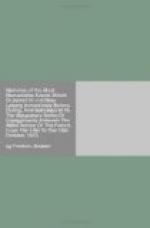As the commander-in-chief had so precipitately quitted the city, we could no longer doubt the proximity of the enemy to our walls. The fire of the artillery and musketry in the place, which gradually approached nearer, was a much more convincing proof of this than we desired. The men already began to cut away the traces, in order to save the horses. The bustle among the soldiers augmented; a weak rearguard had taken post in Reichel’s garden, to keep the allies in check, in case they should penetrate into the high road. We thought them still at a considerable distance, when a confused cry suddenly proclaimed that the Russians had stormed the outer Peter’s gate, and were coming round from the Rossplatz. The French were evidently alarmed. The Russian jaegers came upon them all at once, at full speed, with tremendous huzzas and fixed bayonets, and discharged their pieces singly, without stopping. I now thought it advisable to quit my dangerous post, and hasten home with all possible expedition. I was informed by the way that the Prussians had that moment stormed the Grimma gate, and would be in the city in a few minutes. On all sides was heard the firing of small arms, intermixed at times with the reports of the artillery, already playing upon the waggon-train in the suburbs. Musket-balls, passing over the city wall, likewise whizzed through the streets; and, when I ventured to put my head out of the window, I observed with horror, not far from my house, two Prussian jaegers pursuing and firing at some Frenchmen who were running away. Behind them I heard the storm-march, and huzzas and shouts of Long live Frederic William! from thousands of voices. A company of Baden jaegers was charged with the defence of the inner Peter’s gate. These troops immediately abandoned their post, and ran as fast as their legs would carry them to the market-place, where they halted, and, like the Saxon grenadier guards, fired not a single shot.




